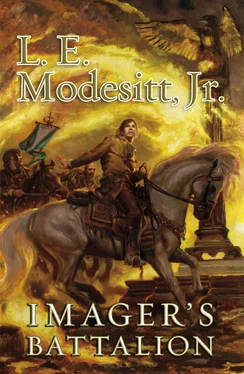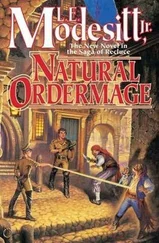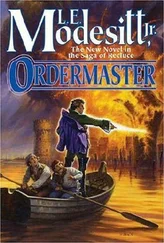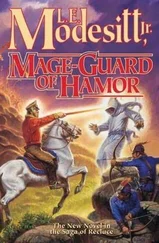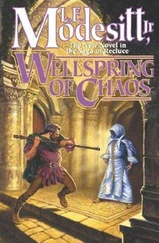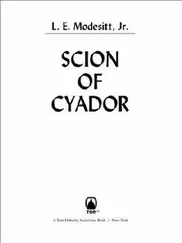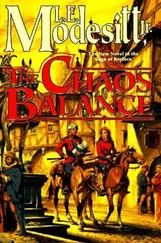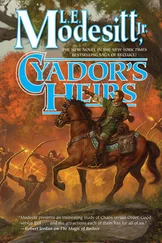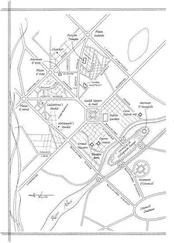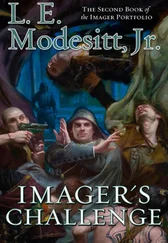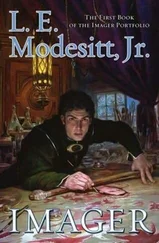L. Modesitt - Imager’s Battalion
Здесь есть возможность читать онлайн «L. Modesitt - Imager’s Battalion» весь текст электронной книги совершенно бесплатно (целиком полную версию без сокращений). В некоторых случаях можно слушать аудио, скачать через торрент в формате fb2 и присутствует краткое содержание. Жанр: Фэнтези, на английском языке. Описание произведения, (предисловие) а так же отзывы посетителей доступны на портале библиотеки ЛибКат.
- Название:Imager’s Battalion
- Автор:
- Жанр:
- Год:неизвестен
- ISBN:нет данных
- Рейтинг книги:5 / 5. Голосов: 1
-
Избранное:Добавить в избранное
- Отзывы:
-
Ваша оценка:
- 100
- 1
- 2
- 3
- 4
- 5
Imager’s Battalion: краткое содержание, описание и аннотация
Предлагаем к чтению аннотацию, описание, краткое содержание или предисловие (зависит от того, что написал сам автор книги «Imager’s Battalion»). Если вы не нашли необходимую информацию о книге — напишите в комментариях, мы постараемся отыскать её.
Imager’s Battalion — читать онлайн бесплатно полную книгу (весь текст) целиком
Ниже представлен текст книги, разбитый по страницам. Система сохранения места последней прочитанной страницы, позволяет с удобством читать онлайн бесплатно книгу «Imager’s Battalion», без необходимости каждый раз заново искать на чём Вы остановились. Поставьте закладку, и сможете в любой момент перейти на страницу, на которой закончили чтение.
Интервал:
Закладка:
Meinyt was already in the plaques room. Skarpa was not.
The older subcommander looked to Quaeryt. “Wager we’ll attack Villerive tomorrow. The commander looks worried, and that ass-saving bastard Deucalon will want things as easy as possible for his troopers.”
“So we attack first, and Deucalon holds back. The Bovarians move more reinforcements across the bridge to stop us, and then Deucalon attacks?”
“Something like that.” Meinyt fingered his chin. “Hope your imagers can do what they’ve done before.”
Quaeryt smiled wryly. “We’ll need to do more.” Not that you know exactly what more to do, since the Bovarians have remained holed up behind their earthworks.
“You will indeed,” said Skarpa, closing the door behind himself and motioning to the chairs around the battered dark oak table. “We’re to attack tomorrow. Marshal Deucalon has not ordered or suggested a specific plan for us. He has ordered us to make a strong enough push to fully occupy the Bovarians.”
Meinyt glanced sideways at Quaeryt, with an “I told you so” look.
“You both have studied the maps and the defenses. Does either of you have any other thoughts? Any concerns?”
Who wouldn’t have concerns? Still, there was nothing he could do about them. Quaeryt shook his head.
Meinyt frowned. “They’ve only got earthworks, so far as I can see.”
“You’re wondering why they’re picking a city that’s not walled?” asked Skarpa.
“It had occurred to me, sir.”
“When was the last time anyone managed to make an attack more than two hundred milles inside Bovaria? For that matter, are there any walled cities in Telaryn except Ferravyl?”
Quaeryt did not mention that some of the older towns, such as Cloisonyt and Montagne, had vestiges of ancient walls remaining.
“Kharst didn’t ever anticipate an attack this far inside Bovaria,” said Skarpa. “And you can’t build stone walls overnight … not even with imagers. Anything else?”
Both subcommanders shook their heads.
“Then we’ll proceed as planned, with each regiment and Fifth Battalion assaulting a different stretch of earthworks so that the defenders can’t concentrate their forces. I’ve already sent a dispatch. Deucalon’s just a few milles east of us on the other side of the river. We’ve got courier boats to cross now.” Skarpa glanced at Quaeryt. “I imagine there will be space for a few private dispatches.”
“Thank you.”
“There is one other matter.”
Quaeryt caught the twinkle in the commander’s eyes. “Yes, sir?”
“I’d appreciate it if you would consider…”
“… conducting services this evening?” finished Quaeryt.
Skarpa nodded.
“I’ll do what I can.”
“You always do. Still say you’re the best chorister I’ve ever heard.”
After leaving Skarpa, Quaeryt returned to his small chamber in the inn, where he quickly read over the letter he had written the night before, especially one section …
After we took Ralaes, we discovered once more the methods by which Rex Kharst enforces control over his High Holders. Commander Skarpa summoned a meeting of senior officers, and as we began, assassins with small crossbows attacked the officers. Through sheer chance … none of our commanders or subcommanders were injured, and we captured two of the assassins. We discovered from them that Kharst maintains several companies of such assassins and that one of their duties is to deal with recalcitrant High Holders. While it is clear that any successful ruler must find a way to maintain order and control over High Holders, it would strike me that a quieter and more subtle form of control might be better suited to a ruler, and that perhaps one that incorporated knowledge and persuasion, leaving a quiet but completely effective force as a last resort … Those problems, if they should exist at all, are in the future. Before long we will be facing the Bovarian forces at Villerive …
He nodded. That would have to do. He added a few sentences of affection and concern, then sealed it and tucked it inside his uniform before heading downstairs. After locating the dispatch orderly, he handed over the letter and a silver, then went to meet with Zhelan.
First he went over the plans for the assault on south Villerive with Zhelan and the company officers, emphasizing the key points in Bovarian to the Khellan majors, then accompanied Zhelan and each officer on an inspection of his company. After that, several glasses later, he returned to the South River Inn and briefed the imager undercaptains, then sent them off to practice another skill that he hoped would prove useful with the earthworks.
Finally, he retired to his chamber to try to come up with yet another homily for the evening services. For a time, he just stood and looked out the window. Finally, he pulled out the small thin book about Rholan and began to page through it, reading phrases and sections until one section finally caught his attention and interest.
The problem with justice is that it is always defined with regard to who offers the definition. Rholan avoided this problem simply by refusing to address it and by defining it as what men and women should do. The definition of justice by a High Holder, however, is likely to differ greatly from what a grower or a peasant regards as justice. A peasant regards it as just that he and his family have enough to eat; the High Holder insists that it is just that sustenance be grown or paid for by those who consume it, while the factor feels that it is only just that he retain a portion of whatever food is traded because he facilitated the exchange. Yet is it just that a man and his family starve because of flood or drought? Is it just that all the effort a High Holder puts into maintaining order and providing seed and storage go for naught because others are hungry? What portion of a harvest is a just portion for a factor to take in return for finding a buyer where the grower cannot? Those scholars who study the exchange of goods claim that justice can only be found in what terms a fair seller and a fair buyer agree upon. But in a time of famine, those who have golds will have food, and those who do not will starve. Is that justice? In a time of war, those who have blades and the skill to wield them best will have golds and food. Is that justice? Yet without the order provided by those with arms, all will suffer, and there will certainly be no justice.
So far as I know, Rholan seldom, if ever, addressed such a question, except in generalities, and with humor, and that may be why he will be remembered, and why I have chosen to remain, if you will, nameless.
Quaeryt couldn’t help but ask, Who was the writer who knew and understood Rholan so well? So far as he could tell, the book didn’t offer any clues, not in all the times he’d read it and leafed through the pages. Even at the end of all the text, in the lower left-hand corner of the page there was only a jumble of letters, “T(N)of D.” Had that meant, “The End” or did it signify something else?
Nor was justice an apt subject for troopers about to attack a town, where, as Rholan had said, the only “justice” was provided by the edge of a sabre.
He finally came to yet another section that offered a certain … possibility.
Rholan traveled much, although his journeys were seldom that long, and most, if not all, of his travels remained within Tela. He often commented, both in conversation and in his public utterances, upon roads, using them both factually and metaphorically. Upon one occasion at table he observed that all too many wide and smooth roads leading from towns or holdings soon deteriorated into the meanest of ways once the traveler was beyond the eyeshot of those in power. As he so often did, however, he reversed that observation by declaring that a traveler need be most cautious when the meanest of ways turned within a few hundred yards to a splendid road. That proclaimed more clearly than anything that those in power were self-centered and egotistical because only the road they could see mattered to them, and not the roads they could not see and would never travel.
Читать дальшеИнтервал:
Закладка:
Похожие книги на «Imager’s Battalion»
Представляем Вашему вниманию похожие книги на «Imager’s Battalion» списком для выбора. Мы отобрали схожую по названию и смыслу литературу в надежде предоставить читателям больше вариантов отыскать новые, интересные, ещё непрочитанные произведения.
Обсуждение, отзывы о книге «Imager’s Battalion» и просто собственные мнения читателей. Оставьте ваши комментарии, напишите, что Вы думаете о произведении, его смысле или главных героях. Укажите что конкретно понравилось, а что нет, и почему Вы так считаете.
